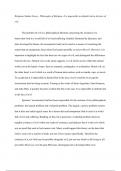Religious Studies Essay - Philosophy of Religion: It is impossible to defend God in the face of
evil.
The problem of evil is a philosophical dilemma concerning the existence of a
benevolent God in a world full of evil and suffering. Initially illustrated by Epicurus, and
later developed by Hume, the inconsistent triad can be used as a means of visualising the
notion that an omnipotent, benevolent God cannot possibly co-exist with evil. However, it is
important to highlight the fact that there are two types of evil, and distinguish the differences
between the two. Natural evil, as the name suggests, is evil which occurs within the natural
world, not at the hands of man. Such as tsunamis, earthquakes, or avalanches. Moral evil, on
the other hand, is evil which is a result of human intervention, such as murder, rape, or incest.
To accept that it is impossible to defend God in the face of evil would be to accept the
inconsistent triad as being accurate. Turning to the works of Saint Augustine, Saint Irenaeus,
and John Hick, it quickly becomes evident that this is the case. It is impossible to defend God
in the face of evil.
Epicurus’ inconsistent triad has been responsible for the creation of two philosophical
problems: the logical problem and evidential problem. The logical, a priori, problem reasons
that it does not make logical sense for a benevolent and omnipotent God to exist in a world
full of evil and suffering. Building on this, the a posteriori, evidential problem observes
tangible evidence of evil within our realm of existence, and deduces that it is this evil which
acts as proof that such a God cannot exist. Many would support this theory on the basis that
God is seen to be a teacher of truth, not one of love justice specifically. Therefore the
existence of a just God may be possible alongside evil, just not one which is all loving or all
powerful. However, over the past 800 years, theologians have developed their own




